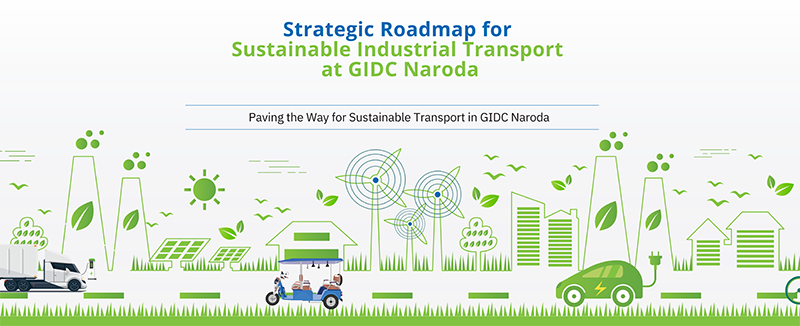Roadmap for Sustainable and Efficient Transport for GIDC Naroda

Urbanisation is accelerating across the globe, with cities emerging as magnets for growth, jobs, and opportunity. India, now the most populous nation, is witnessing a surge in urban population and infrastructure demands. As urban areas expand, emissions from sectors like transport are rising rapidly, threatening local air quality and public health. In response, India has launched national initiatives like the National Clean Air Programme (NCAP) and committed to net-zero emissions by 2070. Within this broader effort, sector-specific and area-based interventions—especially in transport—are critical to reducing emissions and building more resilient cities.
As part of the Decarbonisation Challenge Fund by SIDBI, TERI is collaborating with GIDC Naroda and the Naroda Industries Association to design and implement targeted strategies for reducing transport-related emissions within the industrial estate and to provide continued support for their effective execution.
GIDC Naroda
GIDC Naroda, one of the earliest and most significant industrial estates in Ahmedabad, spans over 252 hectares and supports more than 1,200 industrial units. The estate sees heavy vehicular movement, contributing nearly 40% of the city’s freight traffic. With around 4,500 freight vehicles and about 13,000 passenger vehicles moving through daily, air quality in and around the estate suffers from both industrial and vehicular emissions. Short-distance freight trips and congestion further exacerbate environmental degradation and hinder equitable access to clean, safe transport.
Key Tasks & Objectives
The project aims to accelerate sustainable mobility and optimize transport systems in Naroda GIDC by introducing clean technologies. Current efforts focus on:
- Mapping the fleet pattern and transport demand in the Naroda GIDC area
- Identifying key vehicle segments and services with potential for electrification
- Assessing the technical and financial feasibility of transitioning to clean technologies
- Coordinating with stakeholders to develop a phased transition and implementation plan
- Piloting clean vehicle solutions for targeted use cases
- Scaling up successful models and strategies to enhance air quality, reduce emissions, and improve mobility - especially for women and workers in the estate.
This initiative is a step towards low-emission urban transport planning tailored for industrial zones and showcases how targeted interventions can support India's climate and air quality goals.
